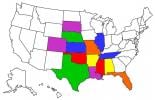 |
 09-25-2020, 08:25 AM
09-25-2020, 08:25 AM
|
#1
|
|
Lost in the Woods
Join Date: Apr 2019
Location: Ocean County
Posts: 2,807
|
Battery Charging by Engine AND Generator
I know with these rigs, the house batteries charge when you're driving and the engine is running. They will also charge when the generator is fired up through the convertor.
My question, do the batteries charge when BOTH are running? If you fire up the engine and the generator at the same time, will they both charge, and put juice faster into the batteries?
Just wondering, if you're boondocking, and need to top off the batteries, will running both motors at the same time complete the process quicker?
|

|

|
 09-25-2020, 09:08 AM
09-25-2020, 09:08 AM
|
#2
|
|
Senior Member
Join Date: Nov 2011
Location: Where ever the boss says we're going.
Posts: 16,078
|
The built in regulator on the alternator may be overridden by the converter output or vice-versa if you have the smart charger, but it is a good question.
__________________
 DISNEY LOVERS
|

|

|
 09-25-2020, 09:43 AM
09-25-2020, 09:43 AM
|
#3
|
|
Lost in the Woods
Join Date: Apr 2019
Location: Ocean County
Posts: 2,807
|
Quote:
Originally Posted by Grumpy

The built in regulator on the alternator may be overridden by the converter output or vice-versa if you have the smart charger, but it is a good question.
|
That's what I'm wondering, which one would over power and win? I remember from testing, I would see like 14.4 volts coming from the alternator, but I don't think the smart charger jumps that high.
I did a test to get an idea what output the alternator could do. I believe it's a 130 amp. I installed an inverter in the rig, and ran the coffee maker (700 watts) just on battery only, and saw voltage drop from around 12.6 down to 11.3 during the cycle.
Then, I fired up the engine, and ran it again to see what the voltage drop would be. There was only about a .2 volt drop, which tells me, at idle, the alternator could even keep up with that 700 watt load (or about 70 amps at 12 volt.)
So, still wondering, which is the best way to top off the batteries the quickest. Engine only, genny only, or both together?
|

|

|
 09-25-2020, 09:56 AM
09-25-2020, 09:56 AM
|
#4
|
|
Senior Member
Join Date: Nov 2011
Location: Where ever the boss says we're going.
Posts: 16,078
|
Quote:
Originally Posted by RetiredOne

That's what I'm wondering, which one would over power and win? I remember from testing, I would see like 14.4 volts coming from the alternator, but I don't think the smart charger jumps that high.
|
It only puts out 14.4 in boost or desulfation so you would have to manually push the button for maximum output.
__________________
 DISNEY LOVERS
|

|

|
 09-25-2020, 10:12 AM
09-25-2020, 10:12 AM
|
#5
|
|
Senior Member
Join Date: Sep 2013
Location: South Texas
Posts: 7,216
|
I would think it would be relatively simple to test? Put a volt meter on, turn on the engine and see what you get. Turn engine off, generator on, see what you get. Turn engine AND generator on, see what you get.
I agree, it's a good question.
I'm not entirely certain but I would assume the alternator would default to whatever the chassis battery needs via the voltage regulator. So, if the chassis battery is charged up, you're likely only going to get ~13.2 volts, and that's what the house battery will get. I don't know that the isolation circuit will allow the alternator to regulate voltage based on the house battery because it's not really part of the "bank".
The converter would default to what the house battery needs using the "charge wizard" to manage the voltage (varies between 13.2 V and 14.4 V). It's unlikely the converter would be able to see the voltage on the chassis battery and change voltage accordingly, again because the chassis battery is not part of its "bank".
Where the confusion would come in would be if the alternator is putting out 14V, and all 14V are making it to the house battery, the converter would be reading the house battery as being charged (14V) and would decrease output voltage to 13.2 (float). So the house battery would be getting 14V. Right?
And if the converter were able to get 14V to the chassis battery (which I don't think it can; the trick-l-charge should only be allowing float charge IIRC @ 13.2V through to the chassis battery, and only then after the house battery is fully charged), and the chassis was reading that to regulate the voltage from the alternator, the voltage regulator would decrease voltage accordingly out of the alternator into the chassis battery.
Of course, all of this is just a guess; I haven't put a meter on any of this stuff.
__________________

-2018 Greyhawk 29MV
-2020 Jeep Wrangler Unlimited (JLU) (Primary Toad)
-1994 Jeep Wrangler YJ (Secondary Toad)
-2014 Jay Flight 28BHBE & Ram 2500 6.4L CC 4x4 (sold)
|

|

|
 09-25-2020, 10:51 AM
09-25-2020, 10:51 AM
|
#6
|
|
Senior Member
Join Date: Aug 2020
Location: Litchfield
Posts: 241
|
Car and truck alternators provide a float voltage to batteries. This works well for batteries that are not used for deep cycle discharges. They typically provide around 12.8V to the battery. If the battery is depleted, it can take several hours of charge time to bring the batteries back up to a full charge. This is how the built-in charger works in my Jayco. It's not well suited to boondocking. I can hook up a small generator (e.g. Honda EU2000), but I need to run it for a few hours to charge the battery.
Some campers have smart chargers. These bring the battery up to a bulk charge voltage of about 14.4V for a fast charge period, usually around 90 minutes. The charger then switches to absorption mode with a charge voltage of about 13.8V for another period. The charger may then switch to a float mode. The better chargers monitor battery temperature to avoid over charging. If I were doing a lot of boondocking, I'd swap out the stock Jayco charger for something better. The best systems include a built-in inverter.
To answer your specific question, if more than one charger is hooked up, the higher charge rate will win. There is no value in doubling up the chargers.
|

|

|
 09-25-2020, 12:06 PM
09-25-2020, 12:06 PM
|
#7
|
|
Senior Member
Join Date: Apr 2017
Location: Inland Empire, California
Posts: 2,002
|
One additional test you could perform is to measure the charge current under each condition. All you need is a DC clamp multimeter. I bought one from Amazon and it helped me diagnose a problem with my solar panels.
Charge current is more important than the voltage. I have trickle chargers that put out only 1 amp but the voltage across the battery still shows in the 14+ range.
As far as which is better to use for charging, well it may depend on the gauge of wire between the charging device and the battery. The heavier the gauge wiring the more current. Wire run length also can come into play.
Alternator charging or converter charging using the generator. In my opinion, the converter wins out. Mine is capable of 60 amps. But my determining factor is which uses less gas - big ass engine or little generator engine. I go with the little one. Just my preference.
__________________
 Jim
Jim
Retired electronic technician (45 years in the field)
2017 Greyhawk 29W (solar & many other mods)
wife (maybe I should have given her top billing)
|

|

|
 |
| Thread Tools |
Search this Thread |
|
|
|
| Display Modes |
 Linear Mode Linear Mode
|
 Posting Rules
Posting Rules
|
You may not post new threads
You may not post replies
You may not post attachments
You may not edit your posts
HTML code is Off
|
|
|
|
 » Recent Threads
» Recent Threads |
|
|
|
|
|
|
|
|
|
|
|
|
|
|
|
|
|
|
|
|
|
|
|
|
|
|
|
|
|
|
|
|
|
|
|
|
|
|
|
|
|